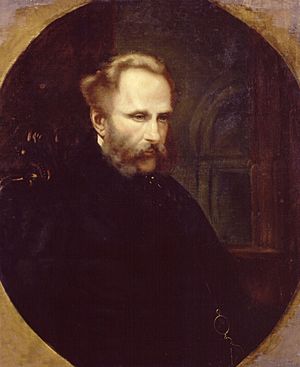Alexander William Kinglake facts for kids
Alexander William Kinglake (born August 5, 1809 – died January 2, 1891) was an English writer and historian. He is famous for his exciting travel book, Eothen, and his long history of the Crimean War.
Contents
Early Life and Education
Alexander Kinglake was born near Taunton, a town in Somerset, England. He went to two well-known schools: Eton College and Trinity College, Cambridge. After his studies, he became a lawyer in 1837. He was very successful in his legal work. But in 1856, he decided to stop being a lawyer. He wanted to spend all his time writing books and working in public life.
A Famous Travel Writer
Kinglake's first book was titled Eothen; or Traces of travel brought home from the East. It was published in 1844 and quickly became very popular. In this book, he described a journey he took about ten years earlier. He traveled through places like Syria, Palestine, and Egypt. Another writer, Elliot Warburton, said the book truly showed "the East itself in vital actual reality."
Historian of the Crimean War
Kinglake's most important work was a huge history book. It was called The Invasion of Crimea: Its Origin, and an Account of its Progress down to the Death of Lord Raglan. This book was published in eight volumes between 1863 and 1887. It is considered one of the best history books of its kind. Some people felt the book was very kind to Lord Raglan. They also thought it was too harsh on Napoleon III, whom Kinglake strongly disliked.
Public Life and Politics
Kinglake was a member of the Whig political party. In 1857, he was elected as a Member of Parliament (MP) for Bridgwater. He won the election again two more times. However, the election results in Bridgwater for 1868 were later canceled. A special investigation found that there had been a lot of corruption. Because of this, the town of Bridgwater lost its right to have MPs in 1870.
Legacy
The town of Kinglake in Victoria, Australia, is named after him. The national park next to the town also carries his name.
Later Life
In the late 1880s, Alexander Kinglake became ill with throat cancer. He passed away on January 2, 1891.
 | Kyle Baker |
 | Joseph Yoakum |
 | Laura Wheeler Waring |
 | Henry Ossawa Tanner |


